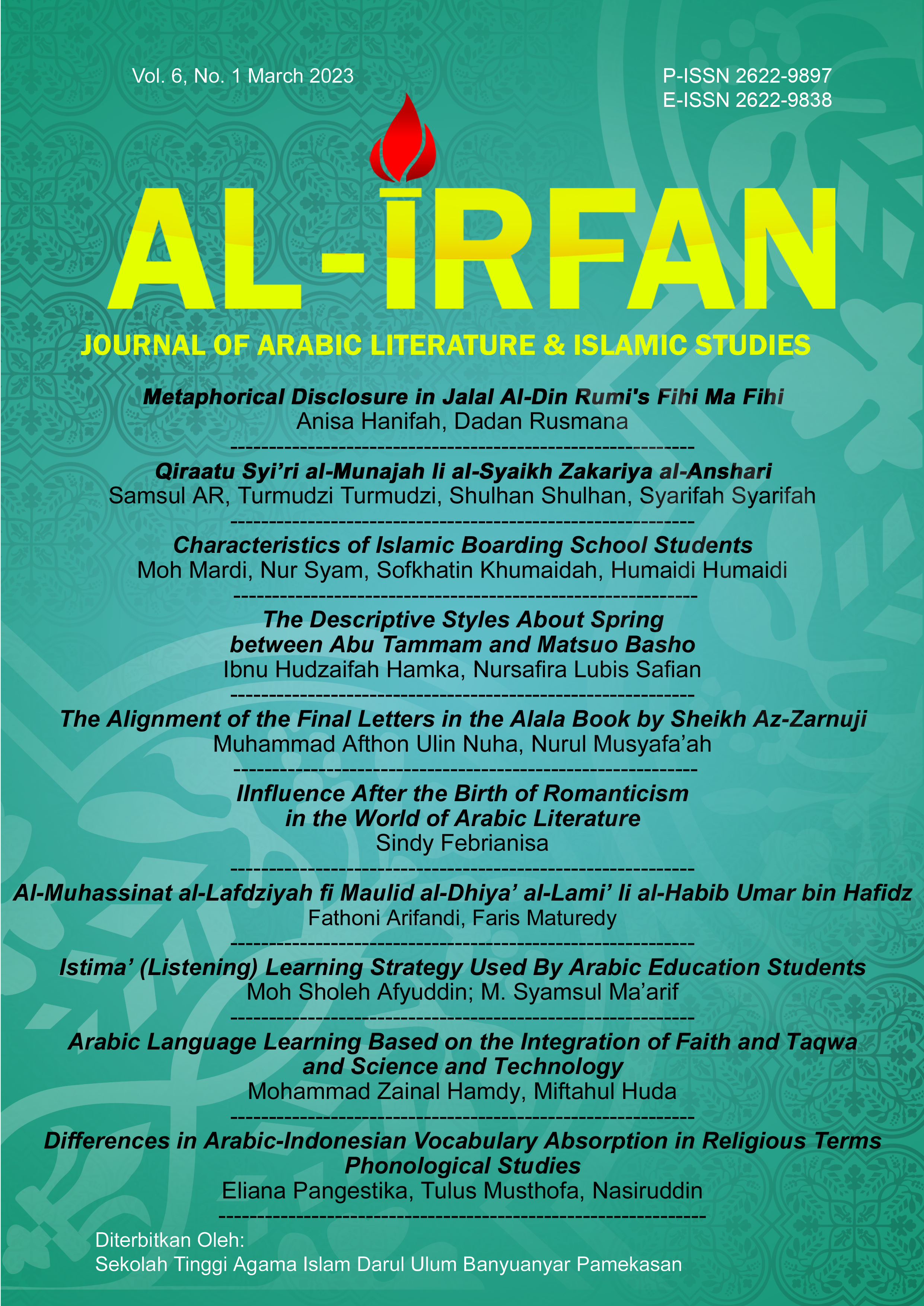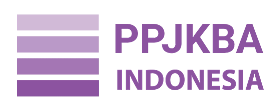Characteristics of Islamic Boarding School Students
A Study of Educational Islamic Characteristics of Islamic Boarding School Students In Syaichona Moh. Cholil Islamic Boarding School Bangkalan
DOI:
https://doi.org/10.58223/alirfan.v6i1.6644Keywords:
Islamic character, Islamic boarding schools, students, teachingAbstract
slamic boarding schools in Indonesia have a significant role to play in producing a young generation with the character to achieve this nation's ideals. Education character will only be formed with support from various parties. Therefore, the role of schools, either formal or non-formal (Islamic boarding schools), is very decisive in achieving that goal. This study aims to describe the character of the Islamic boarding school students (santri) and the inculcation of Islamic morality in the santri who are in the wrong Islamic boarding school in Indonesia, namely the Syaichona Moh Islamic Boarding School. Cholil Bangkalan is part of the contribution of Islamic boarding schools in building a developed and civilized country. This research was conducted with a qualitative descriptive approach with data collection methods: interviews, observation, and documentation. The analysis of Miles and Huberman models found that planting Islamic characters applied in the cottage is integrated with the obligations, prohibitions, and sanctions for those who break the rules. Efforts to instil this character are applied in students' religious activities (ubudiyah), pesantren, and school programs. Then from the efforts to teach the Islamic personality, students are formed religious education which is built on the vision and mission of the pesantren and is strengthened by all shoulder cuttings in the boarding school environmentReferences
Hidayatullah, M. F. (2010). Pendidikan karakter: membangun peradaban bangsa. Yuma Pustaka.
Husnaini, M., & Victorynie, I. (2020). Model of religious character education: A case study in Al-Hilal Islamic Primary School Bekasi, Indonesia. Journal of Social Studies (JSS), 12(1), 103–120. https://doi.org/10.21831/jss.v16i2.34706
Jamaluddin, D. (2013). Character Education in Islamic Perspective. Hikmah, M. (2017). Tingkat Ketertarikan Masyarakat Muslim Terhadap Bank Syariah Di Yogyakarta, Indonesia. Pasal, 4(1), 1., 2(2). ijstr. www.ijstr.org
Martanti, B. H. (2015). Sosiologi Pendidikan dalam Pembentukan Karakter (Studi Sosiologi). PALAPA: Jurnal Studi Keislaman Dan Ilmu Pendidikan, 3(1), 50–62.
Muqowim, M., & Lessy, Z. (2019). Augmenting Science in the Islamic Contemporary World: A Strategic Attempt at Reconstructing the Future. Al-Jami’ah: Journal of Islamic Studies, 57(1), 197–230.
Nasution, H. (2016). Pembaharuan dalam Islam, Sejarah Pemikiran dan Gerakan. Bulan Bintang.
Nata, A. (2001). Sejarah Pendidikan Islam. PT. Grafindo Persada.
Rohmaniyah, I. (2010). Pendidikan Etika, konsep jiwa dan Etika Perspektif Ibnu Miskawaih dalam kontribusinya dalam pendidikan Islam. UIN Maliki Press.
Satori, D., & Komariyah, A. (2017). Metodelogi Penelitian Kualitatif. Alfabeta.
Sugiyono. (2015). Metode Penelitian Kuantitatif Kualitatif. Raja Grafindo Persada.
Sutomo, I. (2014). Modification of character education into akhlaq education for the global community life. Indonesian Journal of Islam and Muslim Societies, 4(2), 291–316.
Syam, N. (2019). Pendidikan Islam Kontemporer Perspektif Sosiologi Transendental. UINSA Surabaya.
Syamsunardi. (2019). Pendidikan Karakter Keluarga Dan Sekolah. Yayasan Ahmar Cendekia Indonesia. Yayasan Ahmar Cendikia Indonesia.
Zainuddin Syarif. (2018). Dinamisasi Manajemen Pendidikan Pesantren; Dari Tradisional Hingga Modern (2 Ø·.). Duta Media Publishing.
Downloads
Published
How to Cite
Issue
Section
License
Copyright (c) 2023 Moh Mardi, Nur Syam, Sofkhatin Khumaidah, Humaidi Humaidi

This work is licensed under a Creative Commons Attribution 4.0 International License.
Lisensi :
Al-Irfan: Journal of Arabic Literature and Islamic Studies is published under conditions Creative Commons Attribution 4.0 International License / CC BY 4.0 This license permits anyone to copy and redistribute this material in any form or format, modify, modify, and make derivative works of this material for any purpose, including commercial purposes, so long as they credit the author for the original work.











